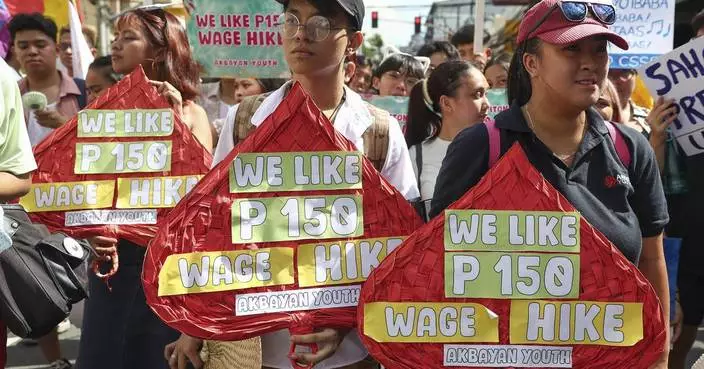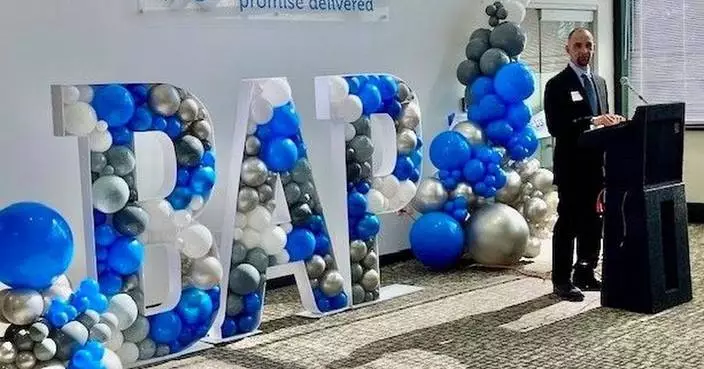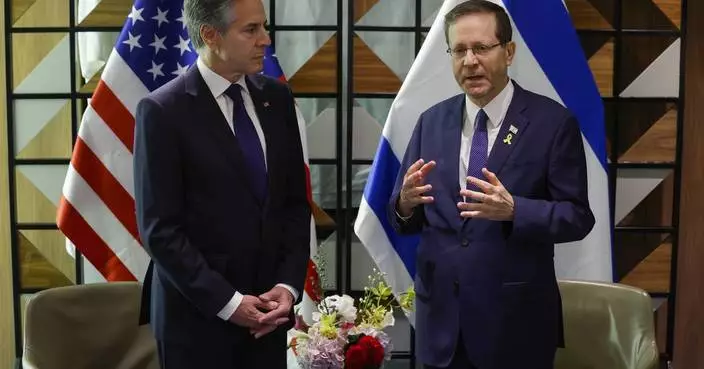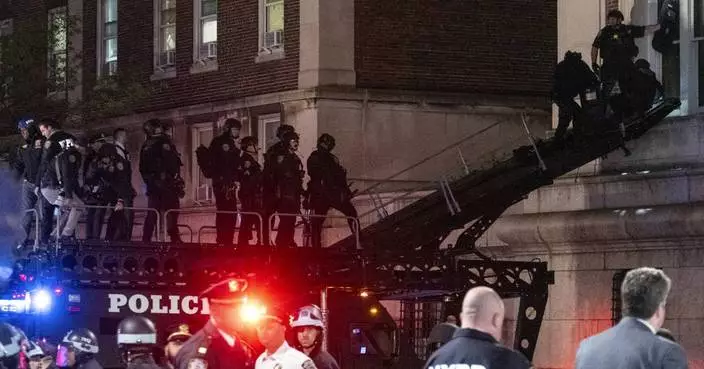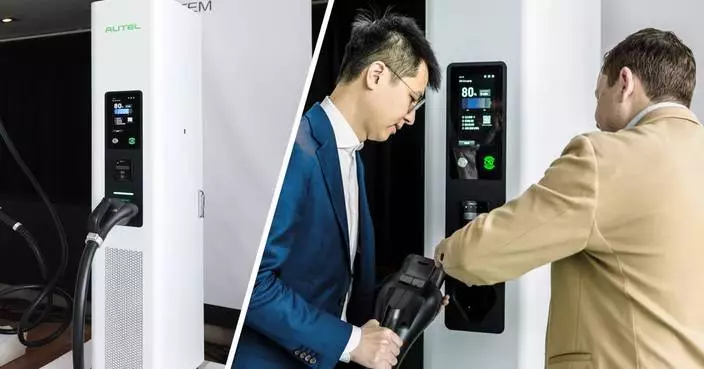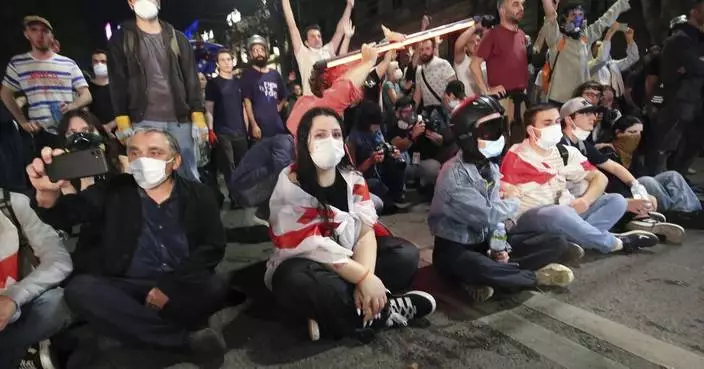A ban on nearly all abortions in Arizona doesn’t sit well with the Republican former governor whose expansion of the state Supreme Court allowed him to appoint the four conservative justices whose ruling cleared the way for it.
Doug Ducey is among Republicans in several states who are wrestling with the consequences of their opposition to abortion since the U.S. Supreme Court overturned Roe v. Wade in 2022. He expanded the state court in 2016, but thinks its ruling this week went too far.
After the Arizona court ruled 4-2 on Monday to revive an 1864 law that criminalizes abortion throughout pregnancy unless a woman’s life is at risk, Ducey posted on the platform X that it was “not the outcome I would have preferred." He said a law he signed in 2022 banning abortions after 15 weeks of pregnancy was more in line with what voters want.
In Virginia, Kentucky and Ohio, where an abortion ban signed into law by Republican Gov. Mike DeWine got overturned in a referendum that enshrined the right to an abortion in the state constitution, the issue has helped Democrats win races and in some cases begin to reverse Republican-led bans.
More may be in store. In Florida, the state's high court cleared the way for a six-week ban that Republican Gov. Ron DeSantis signed while also allowing an abortion-rights referendum go before the state’s voters this November.
Abortion also is a major feature in the presidential race, potentially boosting turnout for Democrats and putting down-ballot Republicans on a back foot. Polls show most U.S. adults don’t support tough restrictions.
Donald Trump, who recently opined that abortion's legality should be left to individual states, has called DeSantis’ approval of Florida's ban a “terrible mistake. " The former president who appointed three of the U.S. Supreme Court justices who overturned Roe v. Wade also said the Arizona Supreme Court ruling went too far.
Ducey said in his post on X that the ban he signed was “thoughtful conservative policy, and an approach to this very sensitive issue that Arizonans can actually agree on."
His comment followed the better part of two years of legal wrangling over the 1864 Arizona law.
The Supreme Court ruling took a fair amount of time, four months after arguments before the court and longer than some expected, said Barbara Atwood, professor emerita at the University of Arizona law school.
“Frankly, I think they struggled,” she said of the justices.
Besides Ducey's five appointees, one of whom abstained from the ruling, two are appointees of Jan Brewer, Arizona's Republican governor from 2009-2015.
Ducey had defended his expansion of the court from five to seven justices. He said the state had outgrown the smaller court and an expansion was long expected. The justices at the time said their workload was manageable and opposed the move.
The crux of the abortion case was whether Arizona’s 2022 or 1864 ban applied after Roe v. Wade was overturned. In late 2022, an appeals court rejected the argument of the state’s elected Republican attorney general, Mark Brnovich, that the 1864 law held sway.
Days later, Democratic Gov. Katie Hobbs and Attorney General Kris Mayes took office, but the case remained alive through the efforts of an anti-abortion intervener.
The legal uncertainty was written into the law outlawing abortion after 15 weeks. It stated that the state’s much stricter 1864 law was not being repealed “by implication or otherwise.”
But even Republicans disagreed over which law would take precedent. In their ruling, the majority justices noted Ducey thought the ban he signed should take effect.
“It’s just interesting that justices who he appointed have reached a point that is at odds with his own understanding,” said Atwood. “It contributed to the general uncertainty about this whole topic.”
Gruver reported from Cheyenne, Wyoming. J.J. Cooper and Jacques Billeaud in Phoenix contributed to this report.
TOPEKA, Kan. (AP) — Some Kansas lawmakers see a chance to lure Kansas City's two biggest professional sports teams across the Missouri border, but an effort to help the Super Bowl champion Chiefs and Major League Baseball's Royals finance new stadiums in Kansas fizzed over concerns about how it might look to taxpayers.
Members of the Republican-controlled Legislature pushed a bill Tuesday that would have allowed Kansas officials to authorize at least $1 billion in bonds to cover the entire cost of building each new stadium, paying the debt off with tax revenues generated in the area over 30 years. But GOP leaders didn't bring it up for a vote before lawmakers adjourned their annual session early Wednesday.
Some critics derided the plan as corporate welfare. Others were receptive but didn't want to pass the proposal until the Legislature approved a broad package of tax cuts for their constituents that Democratic Gov. Laura Kelly would sign — which didn't happen either.
Legislators' work on a plan began in earnest behind the scenes after voters on the Missouri side of the Kansas City metropolitan area decisively refused earlier this month to extend a local sales tax used to keep up the complex housing the Chiefs' Arrowhead Stadium and the Royals' Kauffman Stadium for more than 50 years.
The bill's biggest champion, Kansas House Commerce Committee Chair Sean Tarwater, a Kansas City-area Republican, said supporters want to give the two professional sports teams another option should they contemplate leaving Kansas City, which he said would be devastating to both states.
“You miss 100% of the shots you don’t take,” Tarwater said. “We need them to stay in the metroplex.”
The idea isn't dead yet.
Kelly and her staff signaled Tuesday that she's likely to veto the last tax package lawmakers approved, cutting income, sales and property taxes by a total of almost $1.5 billion over the next three years. Lawmakers expect Kelly to call a special session of the Legislature to try to get lawmakers to pass a tax plan that she'll accept — and they could consider the stadium financing proposal then.
“We just need a little time on it — we’ll be OK," said Senate President Ty Masterson, a Wichita Republican. "I mean, we’re serious about trying to incentivize the Chiefs to come our direction.”
The proposal would allow the bonds to finance 100% of the construction of each of two new professional sports stadiums with at least 30,000 seats. State and local officials would have a year to sign off, and the teams would be on the hook if local tax revenues weren't enough to pay off the bonds.
“It was just a concern of running it before we gave real tax relief to our constituents — kind of that juxtaposed look of what appears to be corporate welfare before you’re getting tax relief to the people,” Masterson said after deciding against having a Senate vote.
Before the local sales tax vote in Missouri, the Chiefs wanted to use their share of the revenues to help pay for an $800 million renovation of Arrowhead. The Royals planned to use their share to help finance a new, $2 billion-plus ballpark district that would be part of a larger nationwide wave of sports construction.
The current lease lease on the two teams' complex lasts through Jan. 31, 2031. Royals owner John Sherman has said the Royals will not play at Kauffman Stadium beyond the 2030 season, the Chiefs are hopeful of remaining at Arrowhead Stadium.
“We’ll be in a situation where we go back to the drawing board,” Chiefs owner Clark Hunt told reporters last week. “I do feel very much a sense of urgency, and we will approach it from a broader perspective going forward.”
Backers argue that the Kansas plan is ideal because the money to pay off the bonds would come from new taxes generated only when the area around each stadium develops. Also, professional players will have to pay the state's income tax on the portion of their earnings made at the stadiums in Kansas.
But Americans for Prosperity-Kansas, a small-government, low-tax group that has long opposed the use of such bonds, also opposed the stadium financing proposal. The group is influential with Republicans and told lawmakers it would consider their votes in evaluating their records.
Critics have long argued that allowing the bonds to finance big projects represents the state picking economic winners and losers instead of the free market. The same kind of bonds have financed multiple projects, including NASCAR's Kansas Speedway in Kansas City, Kansas.
One northeastern Kansas lawmaker, Democratic Sen. Tom Holland, called the stadium proposal “economic development for millionaires.” He added that it’s “total foolishness” to have taxpayers subsidize the stadiums — either through taxes they pay when they visit or because the state forgoes revenues that would flow into its coffers.
Another northeastern Kansas lawmaker, conservative GOP Sen. Dennis Pyle, said: “We’ve got a lot of priorities in Kansas, and I’m not sure that’s one of them."
Other lawmakers were critical because the Legislature had no public hearings or debates before three senators and three House members met in public this week to hash out the details of the proposal.
“As much as I would love to see the Chiefs and the Royals both come to Kansas, this is a very large expenditure of tax money that merits careful consideration, not a last minute scheme,” said Democratic state Rep. John Carmichael, of Wichita.
Skretta reported from Kansas City, Missouri.

Kansas Senate President Ty Masterson, right, R-Andover, speaks during a news conference with other Republican leaders, with House Speaker Dan Hawkins, left, R-Wichita, watching, following the Legislature's adjournment of its annual session, Wednesday, May 1, 2024, at the Statehouse in Topeka, Kan. Some lawmakers hope to lure the Kansas City Chiefs and Kansas City Royals to Kansas with a plan to help them finance new stadiums. (AP Photo/John Hanna)

Kansas Senate President Ty Masterson, right, R-Andover, confers with his communications director Mike Pirner during a break in the Senate's session, Tuesday, April 30, 2024, at the Statehouse in Topeka, Kan. Lawmakers have adjourned their annual session without voting on a proposal to help the Kansas City Chiefs and Kansas City Royals finance new stadiums in Kansas. (AP Photo/John Hanna)

Kansas Senate President Ty Masterson attends a news conference with other Republican legislative leaders, Wednesday, May 1, 2024, at the Statehouse in Topeka, Kan. Masterson didn't bring a proposal to help the Kansas City Chiefs and Kansas City Royals finance new stadiums in Kansas because of the opposition the idea faced. (AP Photo/John Hanna)

Kansas Senate Commerce Committee Chair Renee Erickson, left, R-Wichita, confers with House Commerce Committee Chair Sean Tarwater, right, R-Stilwell, during a break in the Senate's session, Tuesday, April 30, 2024, at the Statehouse in Topeka, Kan. The two lawmakers have helped draft a proposal designed to assist the Kansas City Chiefs football team and the Kansas City Royals baseballs team finance new stadiums in Kansas. (AP Photo/John Hanna)

FILE - Clouds gather over Kauffman Stadium before a baseball game between the Kansas City Royals and the Cleveland Indians, on June 4, 2017, in Kansas City, Mo. Some Kansas lawmakers see a chance to lure Kansas City's two biggest professional sports teams across the Missouri border, but an effort to help the Super Bowl champion Chiefs and Major League Baseball's Royals finance new stadiums in Kansas fizzed over concerns about how it might look to taxpayers. (AP Photo/Charlie Riedel, File)
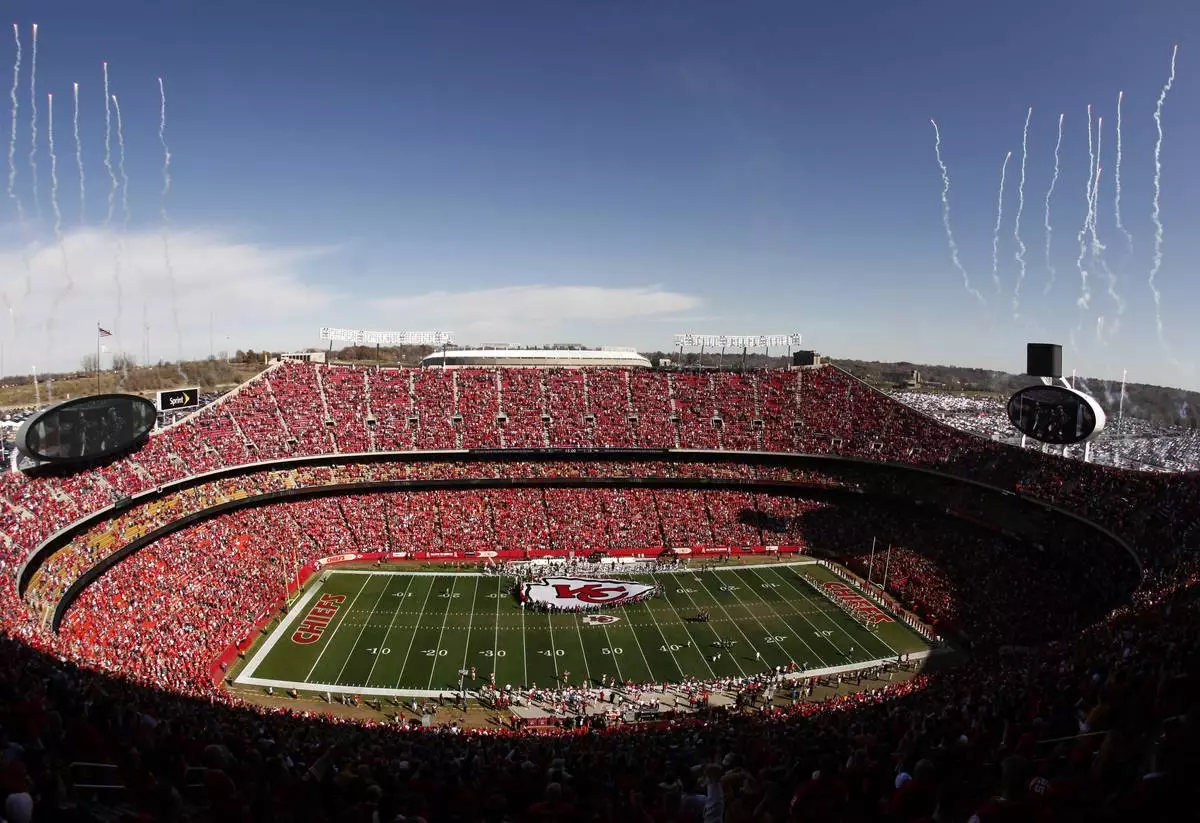
FILE- Fans fill Arrowhead Stadium as fireworks go off before an NFL football game between the Kansas City Chiefs and the Denver Broncos on Nov. 13, 2011, in Kansas City, Mo. Some Kansas lawmakers see a chance to lure Kansas City's two biggest professional sports teams across the Missouri border, but an effort to help the Super Bowl champion Chiefs and Major League Baseball's Royals finance new stadiums in Kansas fizzed over concerns about how it might look to taxpayers. (AP Photo/Charlie Riedel, File)









